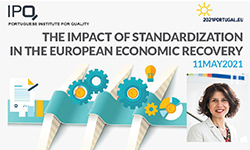BusinessEurope Headlines No. 2021-16
EU-India Business Round Table: enhancing economic relations and building a positive agenda

“Today’s relaunch of the trade negotiations is an essential step forward for both our economies”, said BusinessEurope Director General Markus J. Beyrer at the online event “EU-India Business Round Table” on 8 May. He pointed out that the EU is India’s largest trading partner, with about 11% of its total trade, worth around €80 billion, and the EU is India’s top foreign investor. “Both sides should use this window of opportunity, based on our shared values, commitment to rules-based multilateralism, and benefit from mutual economic opportunities”, he said. The event was organised by BusinessEurope, the Confederation of Portuguese Business (CIP) and the Confederation of Indian Industry (CII), with the support of the Portuguese Presidency of the Council of the European Union. Companies from India and the European Union shared their views on how both sides can strengthen bilateral cooperation in the areas of climate, digital and healthcare and increase trade and investment. “The re-launch of bilateral negotiations for a trade agreement is positive and welcome news. We hope this positive momentum will be maintained and that the level of ambition will remain high throughout the negotiations”, highlighted President Pierre Gattaz. Read our joint statement and watch the event.
![]() Contact: Elena Suárez
Contact: Elena Suárez
Our comment
Pay transparency directive: no silver bullet to tackling the gender pay gap
By Rebekah Smith, Deputy Director for Social Affairs
 On 4 March, the European Commission published its long-awaited proposed directive on pay transparency. The aim: make pay discrimination more visible, so that the principle of equal pay for equal work is better enforced and the gender pay gap is closed.
On 4 March, the European Commission published its long-awaited proposed directive on pay transparency. The aim: make pay discrimination more visible, so that the principle of equal pay for equal work is better enforced and the gender pay gap is closed.
European companies are committed to improving gender equality in society, labour markets and education. Combating the gender pay gap and fighting discrimination where it exists are a crucial part of this. But will the proposed directive actually make a difference? Is legislation on pay transparency really the best option? For sure it’s no silver bullet and the EU mustn’t create false expectations. Real change is only possible if we focus our attention on the root causes – segregation on our labour markets and in education, gender stereotypes, lack of accessible childcare and other care infrastructures, and unequal distribution of household and care duties.
Of course, where pay discrimination exists, it must be rooted out. And depending on how it’s done, pay transparency can shed light on existing pay differences. But there’s no guarantee this will actually show cases of discrimination. In fact, it’s quite likely that companies will go through all of the very detailed and burdensome requirements, and this will simply show that they are paying workers differently for completely justified and objective reasons such as different work tasks or individual performance. Of course, this may help dispel myths that pay differences are a result of discrimination. But it also means that companies will have gone through all of the effort, without actually achieving the aims of the directive. Even worse, a completely justified pay gap within the company could be misinterpreted as discrimination, unjustifiably putting the company’s reputation on the line. This can happen very quickly. Also, is an encouragement to go to the courts really the best way to tackle this? Wouldn’t it be better for both the company and its workers to encourage cooperation and dialogue, rather than fuelling an adversary culture at the workplace?
This is why we’re asking for the measures to be made more proportionate and reasonable. And to take account of what already exists in different countries. We shouldn’t force change in systems that work well. This is particularly crucial regarding national industrial relations systems. In a number of countries, wages are set through collective agreements either at company, sector or national level. The proposal doesn’t adequately take this into account, risking government interference in social partner wage-setting systems. We also need to be careful to not compare apples with pears – comparisons of pay levels need to be based on the actual situation in the company, not a hypothetical one.
We are fully behind the target of the European Commission to increase the employment levels of women. We need a positive narrative in Europe, in which both men and women can grasp economic opportunities. And yes, we need to do more to close the gender pay gap. But the measures must be well targeted and proportionate, if they are to make a real difference.
![]() Contact: Rebekah Smith
Contact: Rebekah Smith
Solid economic recovery is key for a social Europe
 “Policy-makers need to create the conditions that will facilitate job creation and support employers' efforts to hire people”, said BusinessEurope President Pierre Gattaz at the Porto Social Summit on 7 May. The summit was organised by the Portuguese Presidency of the Council of the EU and the European Commission in Portugal to discuss the way forward to achieve Europe’s economic and social objectives and how to implement the European Pillar of Social Rights. Gattaz highlighted that the deep crisis we are facing is a tremendous challenge for companies and that putting additional burden on companies will undermine Europe’s economic recovery and reduce the means to create employment and invest in the green and digital transitions. “European leaders should use in priority non-legislative measures to achieve social goals. To ensure ownership of social policy, politicians need the social partners. European employers and workers organisations have a good track record in finding compromises”, he said. BusinessEurope is part of the signatories of the so-called Porto Social Commitment, which seeks to ensure that European social policy supports the recovery from the Covid-19 crisis and contributes to the green and digital transitions.
“Policy-makers need to create the conditions that will facilitate job creation and support employers' efforts to hire people”, said BusinessEurope President Pierre Gattaz at the Porto Social Summit on 7 May. The summit was organised by the Portuguese Presidency of the Council of the EU and the European Commission in Portugal to discuss the way forward to achieve Europe’s economic and social objectives and how to implement the European Pillar of Social Rights. Gattaz highlighted that the deep crisis we are facing is a tremendous challenge for companies and that putting additional burden on companies will undermine Europe’s economic recovery and reduce the means to create employment and invest in the green and digital transitions. “European leaders should use in priority non-legislative measures to achieve social goals. To ensure ownership of social policy, politicians need the social partners. European employers and workers organisations have a good track record in finding compromises”, he said. BusinessEurope is part of the signatories of the so-called Porto Social Commitment, which seeks to ensure that European social policy supports the recovery from the Covid-19 crisis and contributes to the green and digital transitions.
Contact: Robert Plummer
B7 Summit: proposals for a sustainable and inclusive recovery
 The B7 Summit, which took place on 11-12 May, gathered the political and business leadership from the G7 countries. The high-level discussions provided an opportunity to present to the political leadership recommendations in key areas such as trade, digitalisation, climate as well as on COVID-19 vaccines and international travel. Hosted by the Confederation of British Industries (CBI), the summit was the culmination of several months of work by leading business associations – the Canadian Chamber of Commerce, Medef from France, BusinessEurope, BDI from Germany, Confindustria from Italy, Keidanren from Japan, and the US Chamber of Commerce from the United States, apart from the CBI. Please have a look at the B7 joint statement, which outlines our concrete proposals.
The B7 Summit, which took place on 11-12 May, gathered the political and business leadership from the G7 countries. The high-level discussions provided an opportunity to present to the political leadership recommendations in key areas such as trade, digitalisation, climate as well as on COVID-19 vaccines and international travel. Hosted by the Confederation of British Industries (CBI), the summit was the culmination of several months of work by leading business associations – the Canadian Chamber of Commerce, Medef from France, BusinessEurope, BDI from Germany, Confindustria from Italy, Keidanren from Japan, and the US Chamber of Commerce from the United States, apart from the CBI. Please have a look at the B7 joint statement, which outlines our concrete proposals.
Contact: Sofia Bournou
Standards: key to support EU competitiveness in third markets
 “In modern trade, the main barriers are no longer tariffs but different regulations or different standards that can in practice limit companies’ access to a market, even if there is a free trade agreement in place”, said Luisa Santos, Deputy Director-General of BusinessEurope, at an event organised by the Portuguese Presidency of the Council of the EU and the Portuguese Institute for Quality (IPQ) on 11 May on the Role of Standardisation in the European Economic Recovery. Santos highlighted that a first-mover advantage in setting standards in new and critical technologies will be important to safeguard Europe’s competitiveness but also the ability to retain market share around the world. “But for this to happen, the EU needs to remain an active player in international standardisation bodies, and standards should remain a market driven implementation tool and not a mere extension of EU law” she said.
“In modern trade, the main barriers are no longer tariffs but different regulations or different standards that can in practice limit companies’ access to a market, even if there is a free trade agreement in place”, said Luisa Santos, Deputy Director-General of BusinessEurope, at an event organised by the Portuguese Presidency of the Council of the EU and the Portuguese Institute for Quality (IPQ) on 11 May on the Role of Standardisation in the European Economic Recovery. Santos highlighted that a first-mover advantage in setting standards in new and critical technologies will be important to safeguard Europe’s competitiveness but also the ability to retain market share around the world. “But for this to happen, the EU needs to remain an active player in international standardisation bodies, and standards should remain a market driven implementation tool and not a mere extension of EU law” she said.
Contacts: Eleonora Catella, Lachheb Adnane
Calendar 
- 21 May: Climate Dialogues webinar - Industry cooperation: Being stronger together
- 21 May: Leading the Industrial Renaissance in Europe - webinar
- 25 May: Shaping Europe's Digital Future - Virtual Summit
- 26-27 May: European Social Economy Summit 2021
Not yet a subscriber? Register here.
Reminder: please have a look at our privacy policy